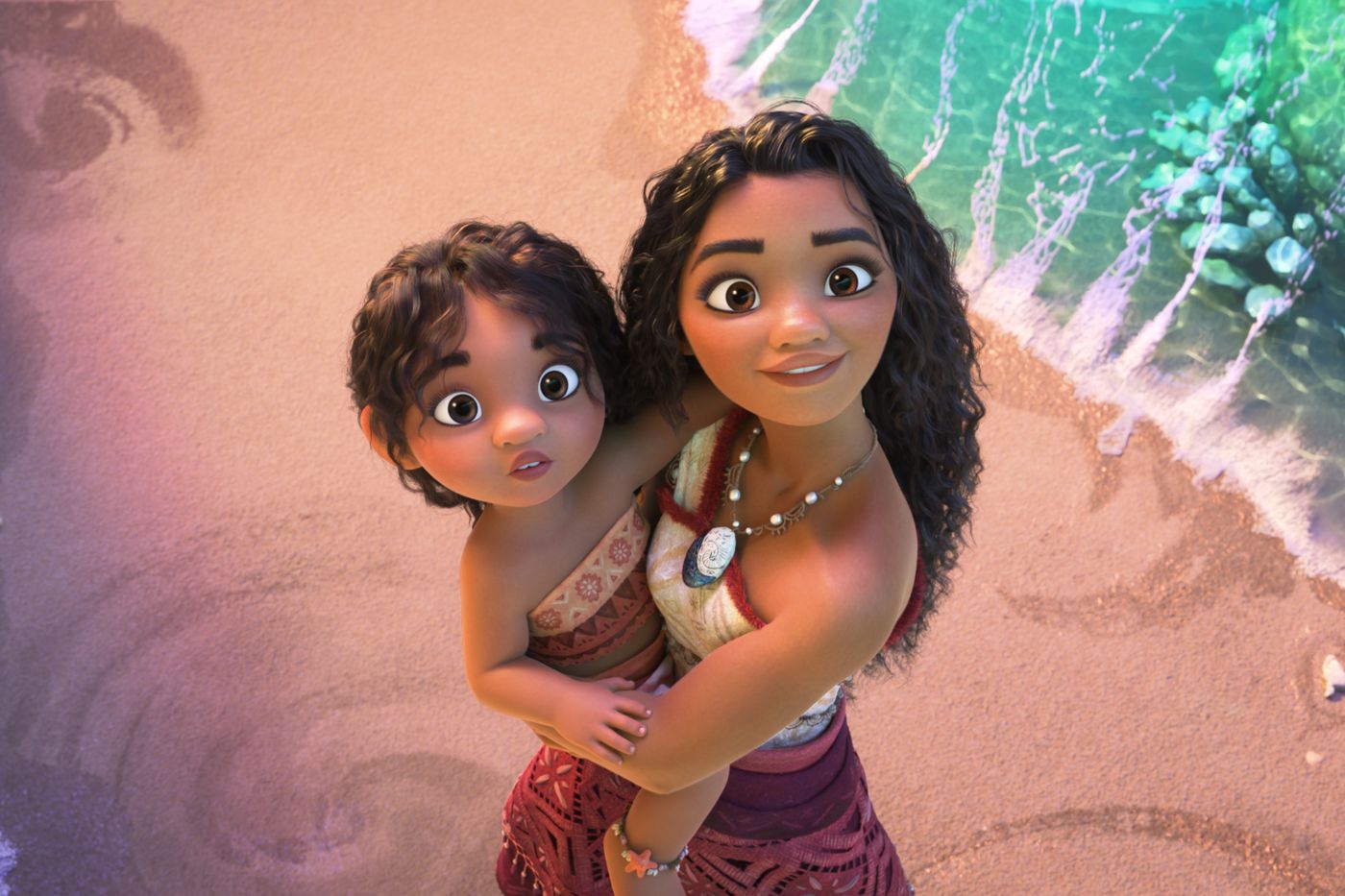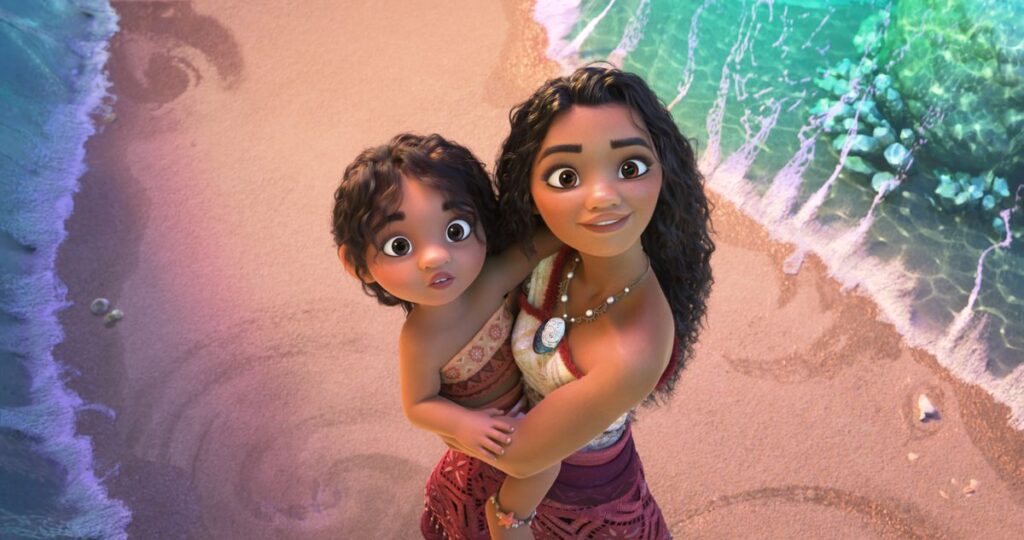[ad_1]

Without him, every song in Moana 2 is as flimsy and disposable as the last.
Photo: Disney
It’s perhaps a blessing to the parents of young children that there’s not a single song in Moana 2 that kids will be singing as they exit the theater or on repeat in the months thereafter. For that to happen, there would have to be a song on the soundtrack worth remembering, and every number in the latest Disney sequel feels as flimsy and disposable as the last. That would be disappointing enough on its own, but the sequel follows 2016’s near-universally beloved Moana and its score, which represents the pinnacle of the modern Disney era. That makes this film no less than an egregious downgrade.
Moana 2 is not a complete disaster so much as a superfluous cash grab that has a hard time disguising its roots as a Disney+ series. It does at least clear the very low bar set by 2023’s abysmal Wish, a critical and box-office failure heavily promoted as a celebration of Disney’s 100th anniversary. But the music of Moana 2 is the biggest mark against it with derivative melodies and clunky lyrics that screech the action to a halt. When the songs occasionally interpolate a line or motif from the original Moana score, it has the water-drop-in-a-desert effect of reminding us how far we’ve fallen.
To be fair, the first Moana is a tough act to follow. Its soundtrack, including the Oscar-nominated “How Far I’ll Go,” helped buoy the title princess to Disney-icon status. The key to the film’s musical success was composer Lin-Manuel Miranda, who collaborated on the songs with Mark Mancina and Opetaia Foa’i. Together, they created a sound steeped in the Polynesian culture the film draws from, with Miranda’s relentlessly catchy tunes turning every song into an earworm. But his lyrics are just as essential — his trademark wordplay and attention to detail deepen the characters and propel the story forward. While there is no Moana without any of the artists who helped make the score indelible, the impact of Miranda’s specific contributions can’t be overstated.
Back in 2016, the composer’s work on the film was widely celebrated, including the aforementioned Oscar nomination (losing to “City of Stars,” which isn’t even the best song in La La Land), and his star was on the rise. Moana was released the year after the seismic Broadway debut of Hamilton, which earned Miranda multiple Tonys, a Grammy, and a Pulitzer and transformed him into a household name. In the years since, as is so often the case, Miranda’s unprecedented success birthed a backlash. A 2020 Rolling Stone report analyzed “Why Gen Z Turned on Lin-Manuel Miranda,” while in 2021 BuzzFeed News dove into “How Lin-Manuel Miranda Went From Cool to Corny.” What’s often lost in the critiques of Miranda being cringe (still not a crime!) is that he’s also an exceptionally gifted artist. And the failure of Moana 2’s bland mimicry is a reminder that we must not take him for granted.
It’s also about more than Moana: In the past ten years of Walt Disney Animation Studios releases, Miranda’s music has emerged as the secret sauce to greatness. Setting aside the nonmusical standouts of the post-Frozen years — Zootopia and Big Hero 6, among others — the animated musicals that have strived to recapture the magic of Disney’s ’90s-renaissance era have fallen flat without Miranda to steer them. Frozen II was a box-office smash without a coherent story to latch on to or a single song that approached the cultural ubiquity of “Let It Go.” Wish was a bafflingly inept mash-up of Disney properties that came and went with stunning speed. And Moana 2, regardless of its inevitable box-office dominance, is the kind of perfunctory follow-up Disney used to relegate straight to VHS.
Miranda, meanwhile, gave us the score to 2021’s Encanto, up there with Moana as the best Disney soundtracks of the past decade. The movie itself faltered at the box office at first, but its positive word of mouth and inescapable songs gave it major success on streaming and brought it back to theaters. Even more than with Moana, the music of Encanto is its strongest selling point. While “Dos Oruguitas” earned the Oscar nom, “Surface Pressure” and “We Don’t Talk About Bruno” broke through as massive crossover hits — the latter is Disney’s longest-reigning Billboard Hot 100 chart-topper in studio history. “Let It Go” wishes.
No song in Moana 2 will come close to Frozen or Encanto chart numbers. Instead of Miranda, the sequel has the songwriting team of Abigail Barlow and Emily Bear, known for their 2021 TikTok series turned concept album, The Unofficial Bridgerton Musical. The pair’s Bridgerton-inspired songs exploded in virality and achieved rare offline success — the album’s Grammy is the first awarded to music developed on TikTok! — but their Moana 2 offerings are unlikely to win them any new fans. Even with Mancina and Foa’i back, the soundtrack is constantly grasping for something well out of reach. That’s especially notable in Moana 2’s “I want” song, the one our hero sings to share what’s propelling her through the journey ahead. You could call “Beyond” a “spiritual sequel” to Moana’s “How Far I’ll Go,” but that’s a generous way of saying “juiceless retread.”
Comparing these two numbers offers a clear distillation of what Miranda brought to Moana and what Barlow and Bear lack. In Moana, the “I want” song tells us everything we need to know about the title character, her preoccupations, and her ultimate destiny. “I wish I could be the perfect daughter / But I come back to the water no matter how hard I try” is classic Disney — the theme of personal desire clashing with parental expectations can be found in The Little Mermaid’s “Part of Your World,” Mulan’s “Reflection,” and Aladdin’s cut “I want” song, “Proud of Your Boy.” At the same time, “How Far I’ll Go” is unique enough to make Moana stand out in the long line of Disney protagonists, few of whom could tackle a tongue-twister like “If the wind in my sail on the sea stays behind me.”
Moana 2’s take on the “I want” song, however, says very little of anything, relying instead on our existing knowledge of the character and vaguely promising something more expansive than the first film. If the original movie asks how far Moana will go, the sequel asks if she can go … even further than that! While the lyrics resemble Miranda’s just enough to make “Beyond” sound familiar, those similarities only serve to highlight Barlow and Bear’s limitations. “I know the path that must be chosen / But this is bigger than before” and “There is destiny in motion / And it’s only just begun” are clunkier, less interesting ways of articulating Miranda’s “Every turn I take, every trail I track / Every path I make, every road leads back / To the place I know where I cannot go / Where I long to be.” The new composers understand the function of an “I want” song but not how to make it sing.
Getting these musical moments right is crucial. “I want” songs are not a Disney invention — they’re fundamental to musical-theater storytelling. During the Disney renaissance, though, they became an essential ingredient to the brand, with composer Alan Menken and lyricist Howard Ashman bringing their Broadway background to films like The Little Mermaid and Beauty and the Beast. It’s this history that Miranda pulls from, telling Vulture in a 2016 interview, “I’m a huge Howard Ashman fan, particularly in his work for Disney, because he imbued Disney characters with a realism in his lyric writing that I don’t think has always been there.” This is the heart of what makes Miranda’s Disney music so peerless: a specificity and deep understanding of character that takes a generational talent to get right. And the textured precision of “We Don’t Talk About Bruno” will always win out over the empty platitudes of Moana 2’s “Can I Get a Chee Hoo?” (Sample lyric: “Moana, come on-a, unlock your destiny.”)
Miranda is not perfect, of course. His work for the Disney live-action movies — an inherently doomed enterprise since he’s being asked to add to already perfect films — includes some of his biggest misfires. (Let us not forget “The Scuttlebutt,” performed by Awkwafina as a CGI gannet.) Still, he has been able to do something with this genre that no one else in recent memory has come close to. Menken and Ashman understood that the key to unlocking Disney magic was in treating these films like the movie musicals they are; Miranda, in understanding Menken and Ashman, has proved himself a worthy heir to their legacy. Disney can continue to try out buzzy composers like Barlow and Bear, but the failure of their Moana 2 score — and Julia Michaels and Benjamin Rice’s Wish soundtrack — shows the danger of hiring songwriters who understand the sound but not the substance. Even with Moana 2 poised to hit new box-office heights, throwaway scores put the Disney musical brand in danger of sinking. It’s time to push past any negative Miranda feelings and let him help right this ship.
[ad_2]
Source link

